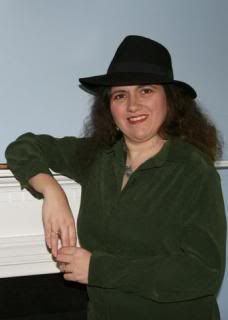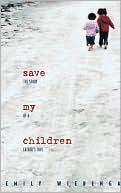 One of my very favorite authors these days is Karina Fabian, whose latest book Magic, Mensa, and Mayhem is a must-read for everyone. And I do mean everyone! Well, not babies, but everyone old enough to understand it.
One of my very favorite authors these days is Karina Fabian, whose latest book Magic, Mensa, and Mayhem is a must-read for everyone. And I do mean everyone! Well, not babies, but everyone old enough to understand it.A few days ago I was blessed enough to have an interview with the fabulous Mrs. Fabian. Here's what she shared with me:
ME: I know this is on your website, but just for any readers who haven't visited yet, could you just tell a little about yourself. What kind of background do you have a far as home life, education, jobs...?
KARINA: My motto is Fiction, Faith and Fun! Because that's the kind of stuff I write about. I'm mother of four kids, and when they were young, I wrote about parenting and homeschooling and childbirth as well, but we've moved past that. Now, I write to entertain them as well as myself.
My husband, Rob Fabian, is a Lt. Col in the Air Force, which makes for a fun life--we've lived in three countries and states five states so far and are moving to California soon. We met while I was in the Air Force, and he's my best friend, my idea man and my co-editor. I hit the jackpot with him and will never know why God blessed me so--but I'm eternally grateful!
I majored in Math, minored in History, seldom use either. I was an intelligence officer in the Air Force, so I can't tell you much about that or I'd have to kill you. My desk is a mess; my to-do list is 121 things long (and those are just the ones I marked with deadlines), and my cat's favorite spot in on the back of my chair. I am a horrendous typist despite lessons.
ME: You have a lot of stuff going on besides writing best-sellers. I know you have several children and you have home-schooled at times. What are some of the other projects, hobbies that keep you running around (the word mayhem comes to mind)?
KARINA: Best sellers--oh, don't I wish! Frankly, I tend to be a pretty mono-focused person. My life is family and writing. I've never been into hobbies, which usually has implications of collecting things. I hate clutter. Yes, even book clutter. Since we move every couple of years, I don't have time or space or patience for stuff. I have played the harp, but haven't done much with it the past 2 years. I'm just not good at spreading my attention.
ME: Magic, Mensa and Mayhem isn't your first endeavor in writing. What other projects have you been involved in as an author/ editor/compiler?
KARINA: Infinite Space, Infinite God: Thought-provoking sci-fi with a Catholic Twist! (Anthology form Twilight Times, www.isigsf.com)
Leaps of Faith: Christian sci-fi because God and Man do co-exist (Anthology from The Writers Café Press, www.leapsoffaithsf.com)
I've also written for several anthologies--especially DragonEye, PI stories. Their cases just seem to lend themselves to anthologies.
--"DragonEye, PI" in Firestorm of Dragons (www.firestormofdragons.com) Vern's first case, where he saves the princess, prevents the closing of the Gap and resists temptation to steal an artifact for himself
--"Mishmash" coming in Tentacles from SamsDot Press. How Vern and Grace meet and team up to stop an ancient demon summoned through a nonsense song.
--"The Faerie Truth Behind the Fairy Tales" coming in Mother Goose is Dead from DragonMoon Press. Vern's article on the many scams based on well-known fairy tales.
Finally, these stories are available on the website, www.dragoneyepi.net:
--"Amateurs" Take an Egyptian goddess, add a pixie turf war and you get one of the Blblical Ten Plagues! How? Join the website at www.dragoneyepi.net and get the free story to find out.
--"Christmas Spirits" When the Ghosts of Christmas haunt a developer bent on destroying Vern and Grace's home, they must put aside their feelings and uncover the cause. (For sale on the website)
--"Fern Gullible" You'll never think of Rumplestiltskin the same way after this locked-room mystery! (For sale on the website.)
I try to put up a new story for sale each quarter.
ME: There are some marvelous characters in this tale with great details about their personalities and actions. I wonder if you have drawn from real life people, even family, to flesh things out?
KARINA: Sometimes, but more often, I draw on The legends themselves. I look at who they were then decide if it's funnier to stretch the cliché, twist it or shatter it altogether. I also think about how exposure to the modern world would affect them. For example, Brunhilde the Valkyrie. Millennia of dealing with violent sweaty men whose idea of heaven is to fight, drink, fornicate and fight again. I can't imagine the finer things like romance or bathing come to mind very often. Now, she hears about our world, where women aren't confined to roles, body sculpting is in, and toothpaste is abundant! So, while she loves her sweaty men, she's exploring herself, staring a line of lingerie for large women, working out on her Bowflex and meeting guys who are sweet and minty. So, not based on anyone I know personally.
ME: How did the original concepts for Dragon Eye, P. I. come about?
KARINA: Vern started out as an idea for the Firestorm of Dragons anthology. I wanted a unique angle on dragons, and came up with a cynical snarky PI after watching a film noir parody on the comedy improv show, "Whose Line Is It, Anyway?"
ME: Vern and Grace, as well as many other characters in the book, crossed over The Gap from Faerie to our world, which they call Mundane. What's the story behind that Gap? Could you compare/contrast Faerie with our world?
KARINA: The Interdimensional Gap was created by a combination nuclear accident in the Mundane and a magical mishap in Faerie. Like Vern says, "sounds like a comic book, I know, but you don't have the knowledge in quantum mechanics or thaumaturgy to understand. For that matter, I barely do." Nowadays, it's just another border crossing. It doesn't look like much actually--kind of a big silvery burlap circle in the middle of a field. On our side, of course, there's a whole infrastructure around it--fences, security, customs, etc.--to keep people from just wandering in and out. On the other side, there are also guards and mages to keep the bad from crossing as well, and both sides have their share of vendors lining the area. Our side looks like an airport; theirs, a fair.
The Mundane world is pretty much like you see here--technological, bureaucratic, wildly diverse in opinions and faith. There, it's the stuff of legend, but never as you'd expect. It's more diverse as far as sentient species, but the humans are almost exclusively Catholic (or agnostic, which is rare). The Church has had to be a strong, organized power because thanks to magic, Satan and his demons are not only more powerful but more visible. Their Church is close enough to ours that you can attend Mass in either world, but there are political and theological differences, as well as cultural ones. The Church is also politically strong. As a result, a lot of their history is different. The New World is very different--no United States, but an Mayan Empire, an Iroquoi Federation... I'm still exploring.
ME: Let's cut to the chase, now. Briefly, just what is Magic, Mensa and Mayhem about?
KARINA: It should have been a cushy job: Vern, the dragon detective, and his partner, the mage Sister Grace, are given an all-expense paid trip to Florida to chaperone a group of Magicals at a Mensa convention. Then the pixies start pranking, the Valkyrie starts vamping and a dwarf goes to Billy Beaver's Fantasyland hoping to be "discovered." Environmentalists protest Vern's "disrupting the ecosystem," while clueless tourists think he's animatronic. When the elves get high on artificial flavorings and declare war on Florida, it turns into the toughest case they aren’t getting paid for.
ME: Was there anything that served as an impetus to this story?
KARINA: My friend, Shirley Starke, edits the North Dakota Mensa newsletter, The Prairie Dawg. She asked me if I had a story, and since World Gathering was taking place that year in Florida, we decided it'd be funny if the Faerie attended.
ME: While reading through Vern's viewpoint, I often wondered how other characters might have presented the same story. In particular Grace. She is an amazing person, in my opinion, and one I'd like to know more about. Do you think her point of view would have been much different than Vern's?
KARINA: Oh, definitely! But, like the Virgin Mary, she's very good at keeping things in the silence of her heart, so I don't know the story from her POV.
ME: Besides Vern, which character was the most enjoyable for you?
KARINA: I loved them all, but the finicky ones were the most fun to write. That's be Jean Pierre the French chef, and Melchior Rawlings, the artist. There's nothing like being able to go overboard with a personality!
ME: What would you hope for people to come away with when they read Magic, Mensa and Mayhem?
KARINA: Sore rib muscles from laughing so hard.
ME: Thanks so much for your time, Karina, and for writing this wonderful story for us to enjoy!
KARINA: Thanks for the interview, Cathi!















